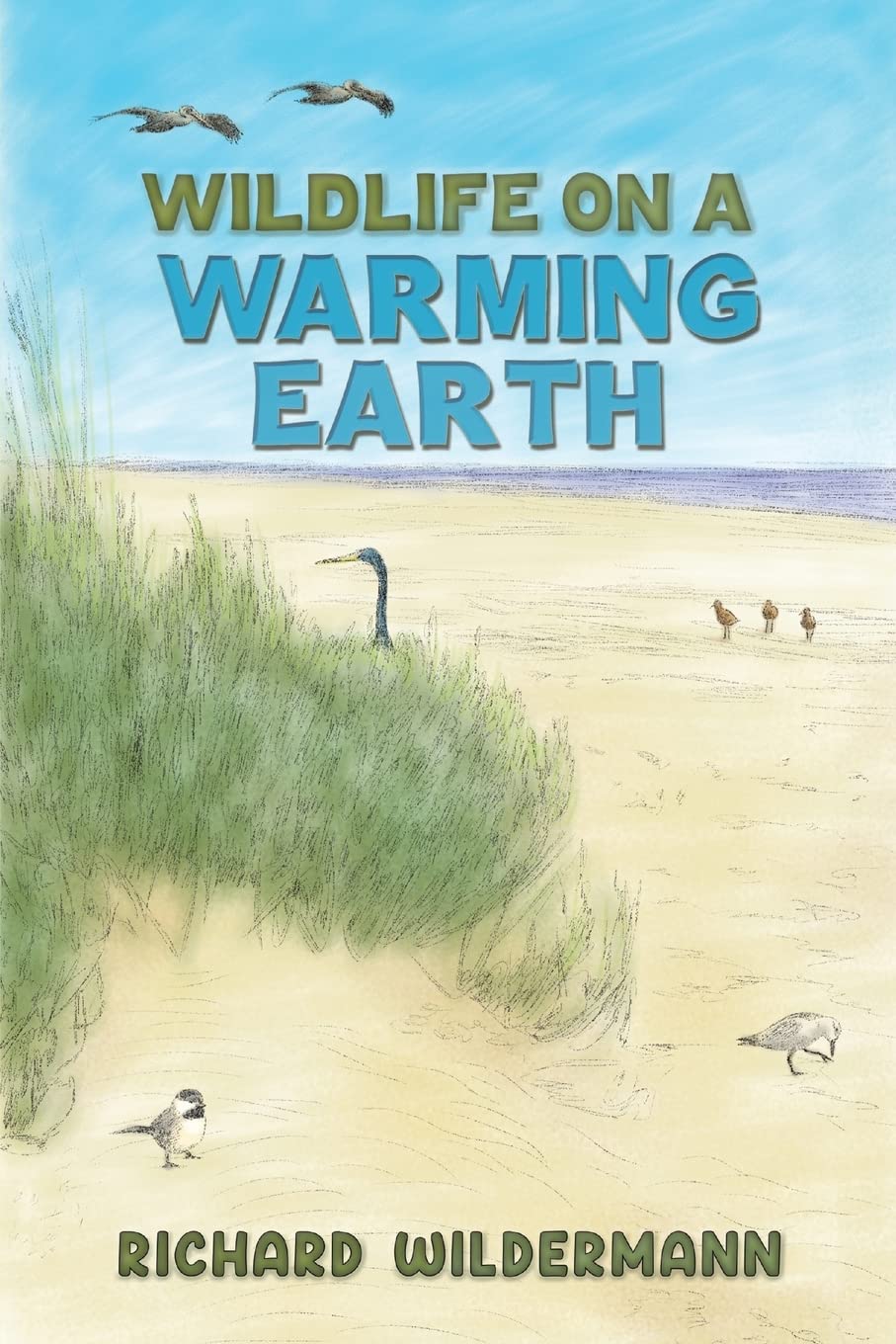
We are now experiencing intense heatwaves both in England and around the world. The right-wing media and some MPs state that this is not caused by man and that people should stop being alarmist. But the scientists know better:
How much of climate change is caused by us? The short answer is all of it. Scientists’ best estimate is that roughly 100% of warming since the mi-20th Century is caused by human activity. Main greenhouse gases are electricity generation and transport. Current research finds that if humans weren’t around, the climate would be cooling slightly. To avoid the worst impacts, we need to stop burning fossil fuels and transition to renewable energy. Dr John Cook (climate scientist)
Wildlife on a Warming Earth is a unique book by a former naval aviator in the US, who later took a degree in forestry and environmental studies. He now lives on a beautiful ocean community in South Carolina, where he is a climate activist. His book looks at how climate change is harming wildlife, explaining how all of nature is connected (on earth, sky and sea).
If you experience a heatwave, drink cool water and stay out of strong heats, eat foods with high water content, wear loose-fitting breathable fabrics and use fans and cool showers to reduce body temperature. Read tips on how to stay safe in the sun (for people and pets).
The World Weather Attribution Network states that 2023 heatwaves in southern Europe, Mexico and USA would have been ‘virtually impossible’ without human-caused climate change. In July 2022, England experienced temperatures of 40c for the first time ever, thought to be caused by temperatures in the Arctic warming four times faster than the global average.
Another effect of raising temperatures is drying out soil, which stops food growing and puts more demand on irrigation, which means less fresh water for everyone worldwide. Even in naturally hot areas (like Africa), rainy seasons are being replaced by drought. And increased temperatures lead to more lightning that leads to more forest fires. Yet paradoxically, Libya had floods from heavy rain, likely caused by climate change.
The 10 highest temperature years in England (since 1884 when records began) have all happened in the last 20 years. In 2022, the highest ever temperature was recorded in Coningsby (Lincolnshire). It was 40.3c (beating the previous record of 38.7c in Cambridge in 2019).
Not only are heatwaves uncomfortable, but they are also very dangerous. Elderly people, children and those with weak immune systems suffer, as do pets and wildlife. As well as issues like heat stroke, there is also an increase in car accidents and drownings. During the 2003 heatwave in Europe, it’s estimated that around 60,000 people died (mostly in southern Europe) due to effects of the heatwave, that lasted just 10 days.
In the Middle East Gulf area, people are experiencing the highest temperatures on earth, even for people used to hot weather. Sometimes temperatures go above 50c, causing heart and other medical issues.
raised temperatures cause heat island effect
Another cause for rising temperatures in inner cities is heat island effect. This makes such areas much warmer than rural areas (usually at night when there is little wind) and can even make pavements too hot for dog paws to walk on. The best ways to help reduce this is by shading the surfaces of buildings and deflect radiation by planting trees, green roofs and vegetation.
If planting trees, learn how to make gardens safe for pets (know trees to avoid near horses (including yew and oak). For indoor trees, avoid facing indoor foliage to gardens, to help stop birds flying into windows.
why the media needs experts to report
In North America, Fox News is often accused of giving free publicity to climate change deniers, due to its right-wing politics. Yet now we have GB News, with many presenters also doing the same. Surprisingly, one is the formerly hugely popular Coast presenter Neil Oliver, who recently said that media and politicians were scaremongering people to be ‘frightened of summer’ due to climate change heatwaves. He’s likely a very nice man, but of course he’s not a climate scientist, and getting these facts wrong has huge consequences.
The claim that ‘terrifying temperatures of at least 40 degrees c were being predicted, in order to ‘control the public’ was quickly disputed by BBC meteorologist Tomasz Schafermaker, who tore the argument up with science. He explains reported temperatures are air temperature (above 1 metre) not ground temperatures, which will have been higher (sometimes in excess of 50 C). This is the problem when we have MPs and media pundits deciding how serious climate change is, rather than listening to scientists and qualified weather forecasters.
heat waves are causing wildfires worldwide

In Hawaii (August 2023), wildfires burned down 5 square miles of local homes and businesses, and will take years to rebuild. The likely cause was climate change but some say fallen power lines may have also contributed. The fires (on Maui and Big Island) killed at least 106 people and forced thousands of people to leave their homes and hotels. The town of Lahaina was more or less destroyed. Even six months later, almost 5000 people (many with pets) were still in emergency accommodation.
In Canada, the British Columbian village of Lytton broke all-time records in 2021, and caused a wildfire that destroyed most buildings. Other causes to wildfires include flares (which oil companies use to burn off gas released from the ground, when drilling for oil).
Another more recent cause of wildfires (excaberted by rising temperatures) is the mass-planting of flammable eucalyptus trees to make ‘biodegradable’ packaging for chocolate and coffee (or tencel fabric). This has already happened in Spain and Portugal, which is why new plantations are banned.
Other risks are dropping cigarette litter (like a match to paper on dry land) and people releasing fire lanterns, which fall mostly to sea (harming marine creatures) but others fall to the ground (in Germany recently, many zoo animals died when one dropped into their enclosure).
Smokey Bear is a great American website, with info on what wildfires are, how to stop them and building safe campfires.
the forgotten species of climate change
Forget-Me-Not is a book by Sophie Pavelle, on finding the forgotten species of climate change in England, which has drizen dozens of species almost to extinction. Demanding action, this describes trips to see 10 rare native species that could be gone by 2050 if habitats continue to decline. Travelling by foot, bike, electric car, train or boat, she journeys from Bodmin Moor to the Orkney Isles. Journey on her low-carbon adventure, and dare to hope with her.






